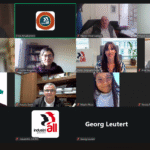Read this article in:
English
17 July, 2025A study on lithium mining in Argentina and Chile reveals the complex relationships between trade unions, companies and governments in a strategic industry for the energy transition. The report, produced as part of the FES-IndustriALL project on the battery supply chain, highlights the challenges in terms of governance, labour conditions and human rights due diligence.
At its presentation, a discussion was held on the situation in the lithium mining sectors in Argentina and Chile, countries that are part of the Lithium Triangle, a key region for the rich reserves of this mineral, which is essential for the manufacture of batteries used in electric vehicles and clean technologies. The research examines relations between workers, companies and governments, with a view to strengthening trade union cooperation and improving social and environmental standards.
The report highlights an increase in lithium production in both countries, despite a loss of global market share to Australia and China, which is also their primary export destination, while downstream industrialisation processes are still in their infancy. In Argentina, the governance framework is fragmented and federalised, while Chile is moving towards a more centralised model with a stronger state presence.
In terms of employment, there is low labour intensity and high levels of outsourcing and wage inequality, although there has been an increase in total employment and women’s participation. Trade union representation is strong but hampered by the difficulties linked to ever more precarious and fragmented contracts.
The implementation of human rights due diligence policies is limited and largely based on voluntary standards. The introduction of stricter regulations in Europe is, however, seen as an opportunity to increase pressure on companies and improve compliance all along the supply chain.
The study was conducted by four researchers from Argentina and Chile with a view to providing IndustriALL affiliates with tools to identify key players and pressure points in a sector that is growing but faced with significant labour and environmental challenges.
Representatives from AOMA (Argentina) and Industrial Chile Constramet participated in the presentation, alongside IndustriALL representatives Laura Carter, deputy regional secretary for Latin America, Georg Leutert, automotive industry director and Diana Junquera, energy and Just Transition director, who said:
“With this study, our affiliates have access to key information and tools that will enable them to organize more workers along the entire battery supply chain, and especially in lithium mining. Understanding the challenges they face is essential to being able to support them, and it is they who will take ownership of this information and be able to make strategic use of it in their trade union work.”


